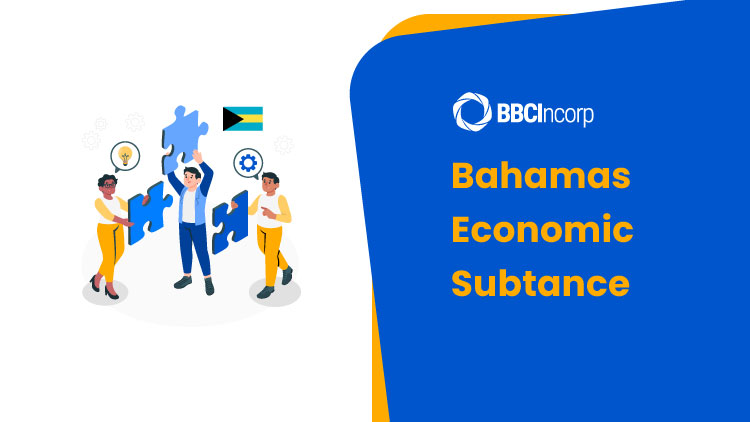
Economic Substance Regulations have been implemented across various jurisdictions such as Belize, the Marshall Islands, and Anguilla. Similar to the widely-applied legislative updates in most offshore jurisdictions, the Bahamas is no exception.
Being a popular choice of offshore company incorporation with Bahamas International Business Company (IBC) as the most common entity, the country prioritizes tax transparency.
Bahamas economic substance requirements came into effect on 1 January 2019. This article helps the in-scope Bahamas companies know how and when to stay compliant with the requirements.
The overview of Bahamas Economic Substance
For many reasons, the Bahamas “tax haven” has become one of the most-searched terms by entrepreneurs around the world.
In fact, the country was blacklisted by the European Union as a non-cooperative jurisdiction for tax purposes in 2019. However, the EU removed the Bahamas from the list in 2020 by fully complying with EU tax standards.
In reaction to the EU and OECD approaches in curbing harmful tax practices caused by many “profit shifting through offshore tax structure” jurisdictions, the Bahamas introduced The Commercial Entities (Substance Requirements) Act, 2018 (CESRA). After CESRA comes the Guidelines, which were then released in February 2019, in the Gazette.
This is one of the stand-out efforts of the Bahamas government to enhance their commitment towards the EU’s policies regarding substance matters. Entities that engage in business activities within the Bahamas must adhere to the regulations set out in the Act.
The Bahamas CESRA walks through the applicability of the Bahamas economic substance, reporting requirements for commercial entities, and possible penalties for non-compliance entities.
In what follows, we will delve into how to apply, and how to comply with the Bahamas economic substance rules.
The scope of Bahamas Economic Substance
The Bahamas Economic Substance Act applies to commercial entities that carry on one or more relevant activities. Such “included entities” are required to satisfy certain substance requirements in the Bahamas.
Commercial entities, as prescribed in the Bahamas CESRA, indicate companies incorporated, registered, or continued under the following legislation:
- The Company Act & includes a foreign entity registered under Part VI thereof
- International Business Company Act
- Partnership Act
- Partnership Limited Liability Act
- Exempt Limited Partnership Act
Like other substance laws in ES jurisdictions worldwide, relevant activities, as above mentioned, cover nine categories of business activities as below:
- Banking Business
- Insurance Business
- Fund Management Business
- Finance and Leasing
- Headquarters Business
- Shipping Business
- Distribution and Service Center Business
- Intellectual Property Business
- Holding Business
A small reminder, an Intellectual Property Business entity in the Bahamas is typically classified as a “low-risk” IP entity and a “high-risk” one.
This classification leads to a bit different and more complicated ES requirements that would be applied to in-scope IP businesses in the Bahamas, compared to other general relevant activities.
Important Note
Intellectual property is considered a high-risk asset if the following criteria are met:
- is acquired from a related party; or
- is not obtained through research and development activities within the Bahamas; or
- is licensed or sold to a related party; or
- is monetized through activities performed by a related party outside of the Bahamas
The Bahamas Economic Substance requirements
The comprehensive test includes three stages namely board management and control, adequacy, and CIGAs. Different from general businesses, there are some different ES requirements for holding companies and IP businesses.
Helpful Tips
In which circumstances can a Bahamas entity be exempted from ES requirements?
- The company is owned by residents in the Bahamas and conducts its core income-generating activities in the Bahamas; or
- The company is centrally managed & controlled outside the Bahamas and is tax resident in jurisdictions other than the Bahamas.
Test 1: Board management and control
- The company has to ensure an adequate number of board meetings are held in the Bahamas;
- The important decisions must be recorded in the minutes;
- The quorum of the board meeting must be physically present in the Bahamas;
- All the meetings have to be recorded and kept in the Bahamas.
- The board of directors must have the expertise and knowledge to be responsible for the duties.
Test 2: Adequate level
- Having an adequate number of full-time qualified employees engaged in the relevant activities;
- Having an adequate amount of operating expenditure concerning the business in the Bahamas;
- Having adequate physical offices in the Bahamas.
Head on over to our tool to determine the compliance requirements for your Bahamas company.
Let's check whether your company is subject to economic substance
requirements in 8 countries. 
![]() Qualification
Test
Qualification
Test ![]() Compliance
Requirement
Compliance
Requirement ![]() Reporting
Obligation
Reporting
Obligation
Test 3: CIGA test
CIGA is the core income-generating activity that the entity must conduct concerning each relevant activity.
Banking
- Raising funds by managing risk, including credit, currency, or interest risk;
- Taking hedging positions;
- Providing loans, credit, or other financial services to customers; or
- Managing regulatory capital and preparing regulatory reports and returns.
Insurance
- Predicting or calculating risk;
- Insuring or re-insuring against risk; or providing clients services.
Fund Management
- Taking decisions on the holding and selling of investments;
- Calculating risk and reserves; or
- Taking decisions on currency or interest fluctuations and hedging positions.
- Preparing relevant regulatory or other reports for government authorities and investors
Financing and leasing
- Agreeing on funding terms;
- Identifying and acquiring assets to be leased (in the case of leasing);
- Setting the terms and duration of any financing or leasing;
- Monitoring and revising any agreements; or
- Managing any risks.
Distribution and service center
- Transporting and storing goods;
- Managing stocks; taking orders; or
- Providing consulting or other administrative services.
Shipping
- Managing crew (including hiring, paying, and overseeing crew members);
- Overhauling and maintaining ships;
- Overseeing and tracking deliveries;
- Determining what goods to deliver and when to deliver them, and organizing and overseeing voyages;
Headquarters
- Taking relevant management decisions;
- Incurring expenditures on behalf of group entities; and
- Coordinating group activities.
In addition, an entity can outsource core income-generating activities provided that the outsourcing provider is located within the Bahamas. An entity has to demonstrate the ability to supervise and control the provider.
One outsourcing provider can only be counted one time if outsourcing services are provided to more than one entity. Entities also need to file a report with the authorities in case of using outsourced activities.
For holding companies
Pure holding companies in the Bahamas would be subject to reduced economic substance requirements as follows:
(a) The entities are obliged to all laws and regulations in the Bahamas.
(b) The entities have adequate human resources and adequate premises in the Bahamas to hold and manage equity participation
Pure holding company
A pure holding company means a company that only holds equity participation or gets revenues by dividends, and capital gains.
For IP businesses
IP businesses in the Bahamas shall suffer an enhanced ES obligation. IP business as high-risk intellectual property is considered to satisfy the Bahamas ES requirements if it is:
- Meeting all above general requirements; and
- Having demonstrations of the below activities to be conducted within the Bahamas:
(a) Taking the strategy and managing principal risks;
(b) Carrying on underlying trading activities within the Bahamas;
(c) A high degree of control over the development, exploitation, maintenance, enhancement, and protection of the intellectual property asset.
Bahamas Economic Substance Reporting
Following CESRA, applicable entities are required to annually prepare and submit documents to the Competent Authority. The annual report must be filed within nine months after the fiscal year end. Entities can have report submissions via an electronic portal.
Prescribed forms for certain commercial entities subject to the Bahamas ES include:
- Form A: For Outsourcing services provider.
- Form B: For included entities and regulated entities.
- Form C: For a holding company
- Form D: For non-included entities.
The offenses for non-compliance entities
The enterprises are subject to certain penalties if they fail to meet the requirements of economic substance and reporting obligations. The offense will cost one hundred and fifty thousand dollars for the first time. The amount must be paid in thirty days.
In the next time penalty, the entity is forced to pay one thousand dollars for every day that the offense has continued. Summary conviction of an entity that is non-compliance with ES requirements will carry a penalty of five or ten thousand dollars or be sent to jail in term of six months or both.
Key Takeaway
Below are a few important highlights you should understand regarding the Bahamas Economic System:
- Commercial entities in the Bahamas that carry out the relevant activities have to comply with the Bahamas Economic Substance requirements.
- High-risk IP companies and holding companies shall be subject to comply with different ES requirements, compared to the general businesses.
- The non-compliance entities are subject to penalties as per the law.
Are you thinking of establishing a Bahamas business for its various benefits and opportunities? Don’t hesitate to discuss further with our team or send an email to BBCIncorp via service@bbcincorp.com. We look forward to working with you!
Disclaimer: While BBCIncorp strives to make the information on this website as timely and accurate as possible, the information itself is for reference purposes only. You should not substitute the information provided in this article for competent legal advice. Feel free to contact BBCIncorp’s customer services for advice on your specific cases.
Industry News & Insights
Get helpful tips and info from our newsletter!
Stay in the know and be empowered with our strategic how-tos, resources, and guidelines.


